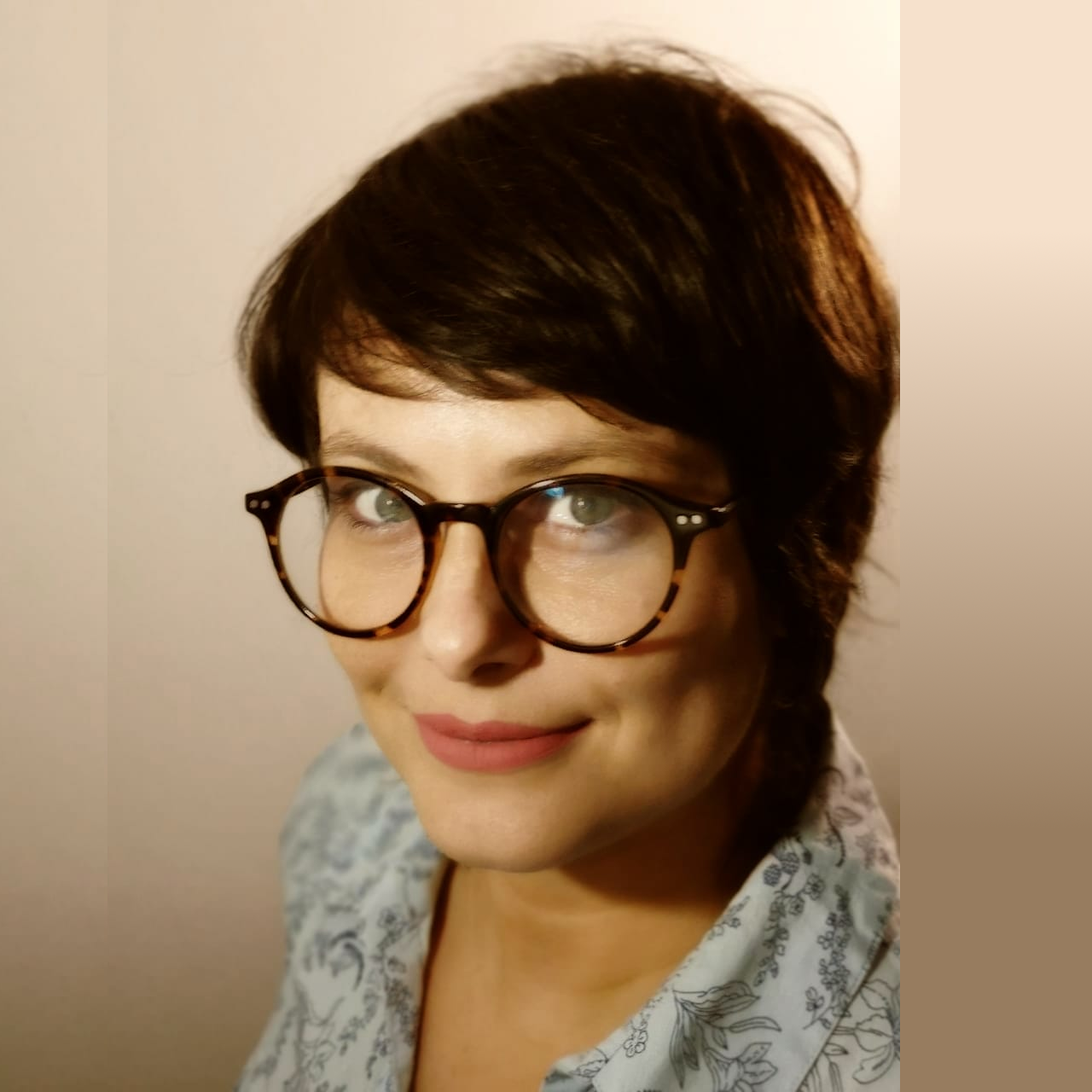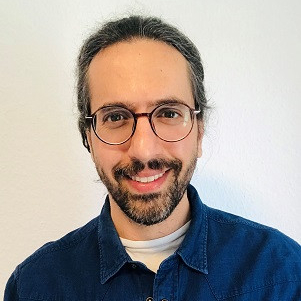Initiated and facilitated by Sebastian Klemm via Proofing Future: Bridging People + Ideas, the MAKING CITICENS HEARD online synergy event on 18 May 2022 brought into exchange international organisations that foster data literacy & open source technologies, transparent financial structures for nonprofits, innovation in public administrations and methods to engage those underrepresented and least heard in societal affairs. Proofing Future thanks all donors and producers of this event: Amanda Bravo-Mendoza, Eleonora Bru, lala.ruhr, Lori McNeill, nextlearning e.V., Open Collective Europe, Stephen Sillett
Reach out, if you are interested in next opportunities to raise connectivity for your projects, initiatives and organisations. We are open to work with sustainability impact driven organisations, collectives, researchers, doers and companies.
Sebastian Klemm: What methods and tools have you evolved to empower citizen initiatives?
Greg Austic, cofounder of Our Sci LLC: We are based out of Michigan in the US, but our team is pretty international: US, Argentina, Switzerland, Hungary.
Our mission is to support communities who want to ask big questions about the world. We have this fundamental belief that the future of knowledge building – which has historically been done in academia or in companies in the last 100 to 200 years – we really think that a lot of the big questions that we have on the future, be it climate change, or societal level questions, they really require societal level groupings of experts and nonexperts to answer. We think that is the future of science, in a big and meaningful way.
Our goal is to support that: How can we support? What are the tools? What are the techniques? What training do people need? How do people communicate effectively, across large groups? How do they communicate both the things that they want to investigate, but also the results of their investigation? How do they collect data in a comparable way? – That is our mission.
A lot of times we work with communities in agriculture, though, that is not really our limitation. It is just where we started. It has been a fascinating journey in the last couple of years.
I think, the most interesting things that we have learned is that how communities want to investigate questions and their motivations is very different than how an academic might. Communities come to questions, not because they want to publish a paper on it, but because they have a deep felt belief that something is true about the world. And they want to validate that truth. And that is not how scientists are supposed to work. But that is how human beings work. And that is fine. We 100% support that.
Our role is to say, Okay, well, let’s validate it if it’s true, but you have to be okay, if it’s not true, you have to be willing to go down the evidence based path on those ideas – and we are there to support you at every turn. That is what we do, and it’s just awesome.
Any communities that we can work with, we want to, because this isn’t about an individual sector, or perspective or outcome – it is really about engaging communities in the process of science and knowledge building.
You can sign up freely here & join our next “Discovery Call with Our Sci” on 2nd August.
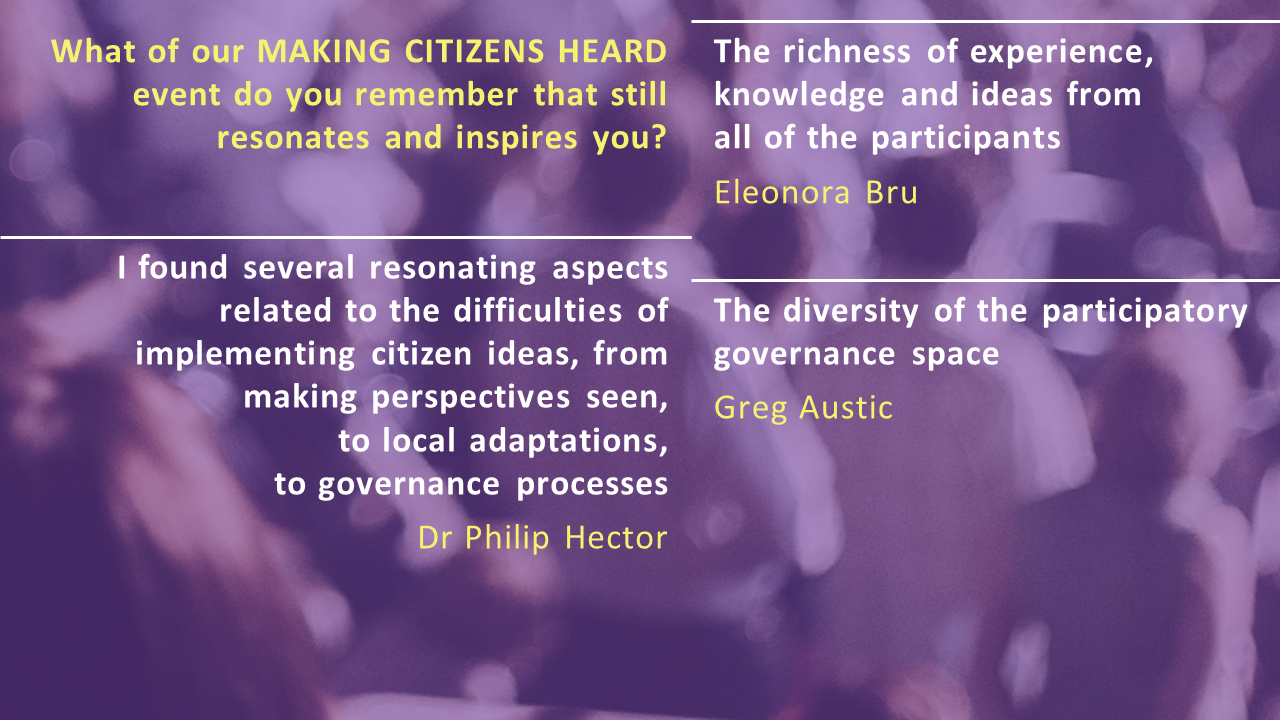
Anna Thunell, City of Västeras: We have so-called e-suggestions, by which every citizen in society can send us an email in the city hall and say we want this to happen. These are then posted, and if they get 100 likes, the board that is responsible for the question is obliged to take it up, to see if there is something that we can or should do.
We also work with citizen dialogues, where both us as politicians, and also our civil servants, travel around the city and talk to people – about new housing projects, or new roads, and schools – and get the citizens perspective, also in rural areas of the municipality, to see what people want.
Another thing that we have been working on for a couple of years now is the citizen budget, where we pick one part of the city out each year, and give them a budget of around 50,000 Euros, that the citizens among themselves, will decide what will happen with this money. – It could be a new playground, it could be better lighting on the bypass, it can be a lot of things. – But the most important thing is that it will be something that the communities desire and want and can get together around. Often it is small things. It could be a new swing on the playground, it could be three new apple trees in the park, it could be a little but good stuff.
We are also actually letting kids vote in certain matters, especially playgrounds. I work at the technical board which is also responsible for playgrounds. When we will build new playgrounds, we often give the kids in the area about two or three different suggestions, and then they will vote which one we will build. For example, that resulted in one playground with a cow theme, one with a space theme. And now we have one with bees.
We also have found a youth board – including youth dialogues – where we collect a group of young people from the age of 13 up to 18, that we will work with all year round. As a politician, I can send them a question over the phone: How do you think about >this<? And they give me an answer. – Like a small advisory board.
Sebastian Klemm: What methods and tools have you evolved to empower citizen initiatives?
Carolyn Hassan, Founder and Director of Knowle West Media Centre: At Knowle West Media Centre, based in South Bristol in the UK, we work hyperlocally and share our experience and our learning. We work on European projects and collaborate internationally. We also run a Living Lab and are part of the European Network of Living Labs.
Our focus is really on learning and social innovation by being embedded in a community. We created Knowle West Media Centre over 20 years ago, codesigned by young people and realized as a Straw Bale Media Centre with the community. Young people as a voice and imagining the future are really powerful. We have a youth council, who inform a lot of what we do.
We focus a lot on a wide variety of arts and tech projects. Our overarching mission is making fair and thriving neighborhoods with art, tech and care. And so we are focused on community wealth building, building social infrastructure, and a fair transition and what does that look like – both environmentally and around social justice?
We are working on projects as varied as a European project around “fuel poverty” called TwinEnergy. In the words of Lorraine Hudson: “In the Bristol pilot of TwinERGY, we have an objective of involving participants who are typically underrepresented in innovative energy projects. The pilot seeks to involve people who experience fuel poverty and those most impacted by oppressive systems based on disability, classism, racism, gender bias and ableism – and as a result of this are often underrepresented in energy research.”
This is our challenge: How do we embed these big ideas and big tech, and actually have some codesign with citizens going? How do we make sure that the voices that aren’t usually heard in this space, not only are heard, but we act on what they say?
For us, making tangible change is really important. We have just completed building two houses in the community using a codesign process of using modern methods of construction and by giving people access to digital making and manufacturing tools.
We have set up and run The Factory – a FabLab with community access to digital technologies, which is in a community that is kind of not doing as well as say the rest of Bristol City. It has underachievement in education. Actually, we believe that there is lots of assets in the community and that together, we can anticipate futures in a very innovative kind of way.
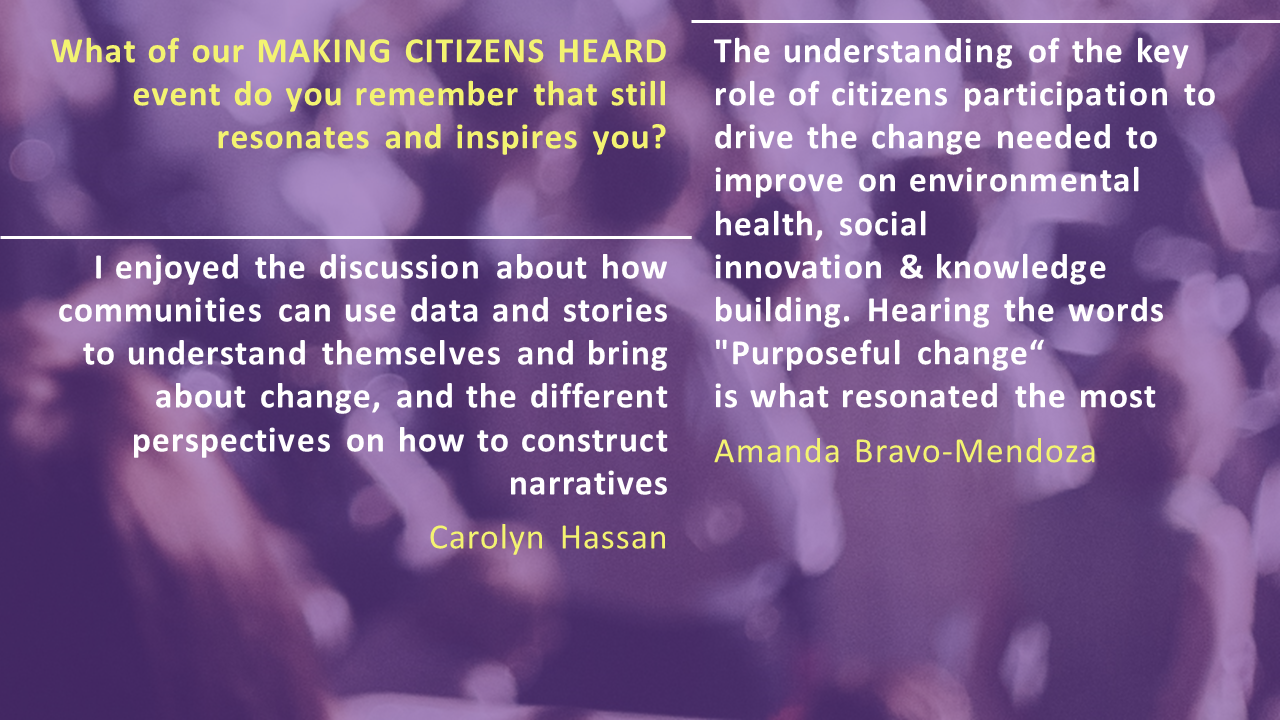
Amanda Bravo-Mendoza, Sustainability Advisor, GoGo Quinoa: Given that we all need to eat, I firmly believe that our food system needs to change. As a food manufacturer, we obviously have to pack our food products, which is where I decided to take responsibility in our hands by reducing our plastic footprint with a series of innovative, pioneering eco-initiatives.
A way to empower citizens would be to give them better food and to provide them also better sources of food and how the system is being implemented. I hope our work and successes can help keep the planet healthy, while inspiring other companies realise what’s possible.
Sebastian Klemm: What methods and tools have you evolved to empower citizen initiatives?
Lori McNeill, Director at The Civic Hacker Network: In the Civic Hacker Network we have a lot of folks who are working hard at empowering citizens. The couple of initiatives that I am aware of really centered around using digital to moderate public discourse, get people out of their social media, flavored silos and talking to each other as real community members using online tools.
Our mission is to connect a global network of people who are using data and technology to make a positive impact in their communities, believing that so much of the issues that we face, have solutions, and as people are working in their disparate ways to solve those problems that we need to socialize what people are doing, we all need to learn from each other. Because, it takes all of us.
Under the umbrella of the Civic Hacker Network, in my region we are embarking on a journey to use geospatial information systems, partnering with the local college to work with students and to use their ArcGIS license to put together a story map around the often talked about, but not documented narrative around the black community here, who was effectively ghettoized into a certain area at one point and then moved out. We are helping students to learn how to use this particular technology, to understand and see the patterns that would explain to them Housing in California is a topic. – Why is housing the way it is? – Why does our community look the way it does? – There is a reason. Hopefully, we are empowering a whole cohort of students to learn how to take data and visualize it in this way and understand their surroundings better.
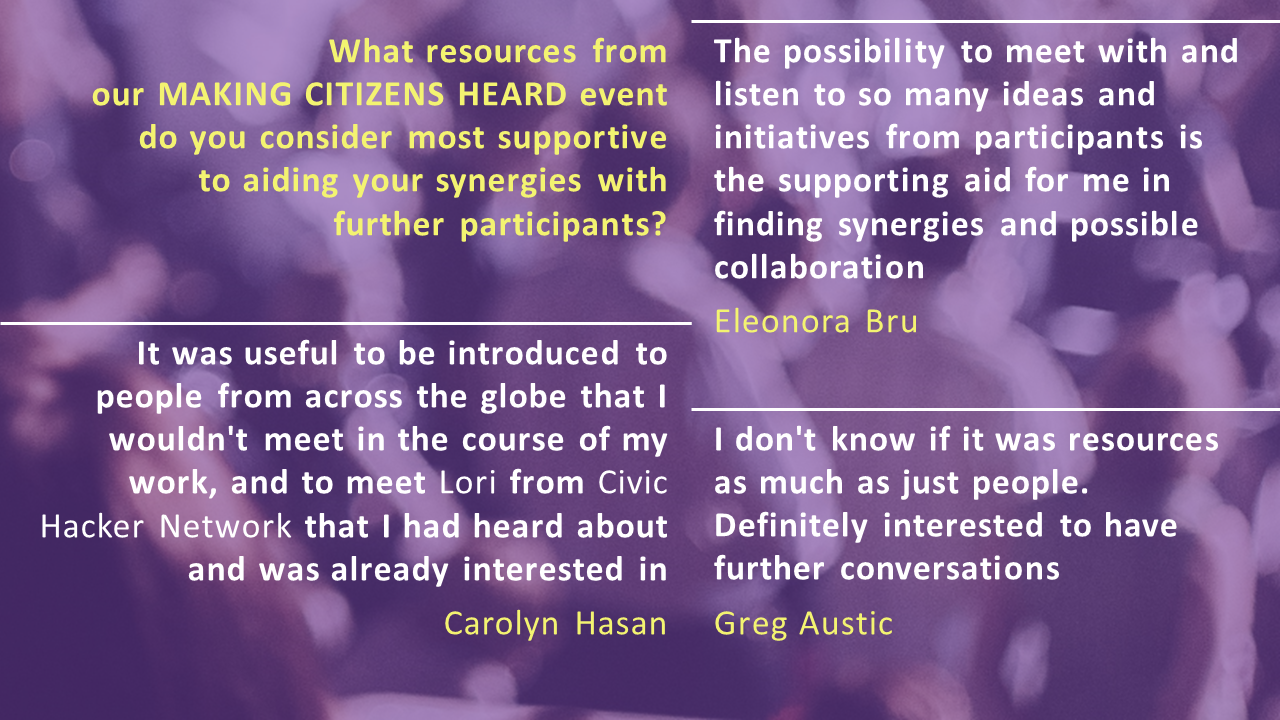
Jean-Francois De Hertogh, Managing Director at Open Collective Europe: The goal of Open Collective is to offer a platform to communities that want to raise funds and spend these funds transparently while these committees do not actually have to incorporate bigger entities.
Open Collective is super useful for any types of groups working on social issues, and wanting to get started quickly without having to go through administration and creating a legal entity by themselves. We are offering huge shortcuts for groups of people, so that they can start working on social impact.
We launched Open Collective Europe three years ago as a nonprofit association in Belgium, and have tax deductible donations within the country of Belgium. We are working with Open Collective Inc, the software company based in the US.
At Open Collective Europe we are fiscally hosting +300 groups. These groups are not incorporated. They use the technology of Open Collective to raise funds, to raise grants as well as public funding. They have access to the Open Collective platform, which allows them to spend and manage their budget transparently.
Sebastian Klemm: What methods and tools have you evolved to empower citizen initiatives?
Dr. Philip Hector, Fellow at Politics for Tomorrow: I am currently working as a fellow at Politics for Tomorrow, an organisation based in Germany, working largely on public sector transformation.
Currently, I work on the Smart City strategy of Berlin, concerned with how to use the vast amount of data that such a huge city has for social and ecological, purposeful change. In order to do that, a big part of our process that started last year, has been altered to not only include people from the administration and various expert groups, but also what is called a “Citizen Panel”, to try to mirror the society of Berlin.
We are especially thinking about: How can we include the wider, silent groups? How can we include people that do not speak German well, the ones not used to online participation processes as well as those who do not know that this kind of citizen participation exists?
I guess you are familiar with that kind of deliberative frame of citizen participation, where you access the Population Register, and then a couple of 100 people reply, and out of that you try to select as diverse as possible a group. So that is, I think, one very particular way of the citizen state relation. My experience with it over the last few months has been that a big part of it – as Steven Sillett mentioned – has been a kind of sense-making. Thinking about, What does this term mean for you? Well, actually, it looks quite different for me. So it has been not so much on about hearing new ideas from citizens – I find that most ideas are anyway, quite there – but about how to find a good process of implementing them.
Another perspective on citizen initiatives that I have stems from my design background, where I had the opportunity to complete a PhD last year. For that I worked with several citizens’ initiatives that set up repair cafés and open workshops in Berlin and Helsinki, where I was studying. I investigated the nature of negotiations between citizens’ groups and public administrations, how they negotiated What is expertise on sustainable consumption and What kind of infrastructures the city should provide. These groups are obviously not pre-selected, they just do something and want to demonstrate something. Such tangible part of a better future, as mentioned by Carolyn Hassan before, was a quite a different take on citizen initiatives.
What I really enjoyed there was the inclusion of small groups of people in academic publications, because I think I have a certain legitimacy as a researcher. I think, including such small groups in publications is one way to make them more heard and more inclusive.
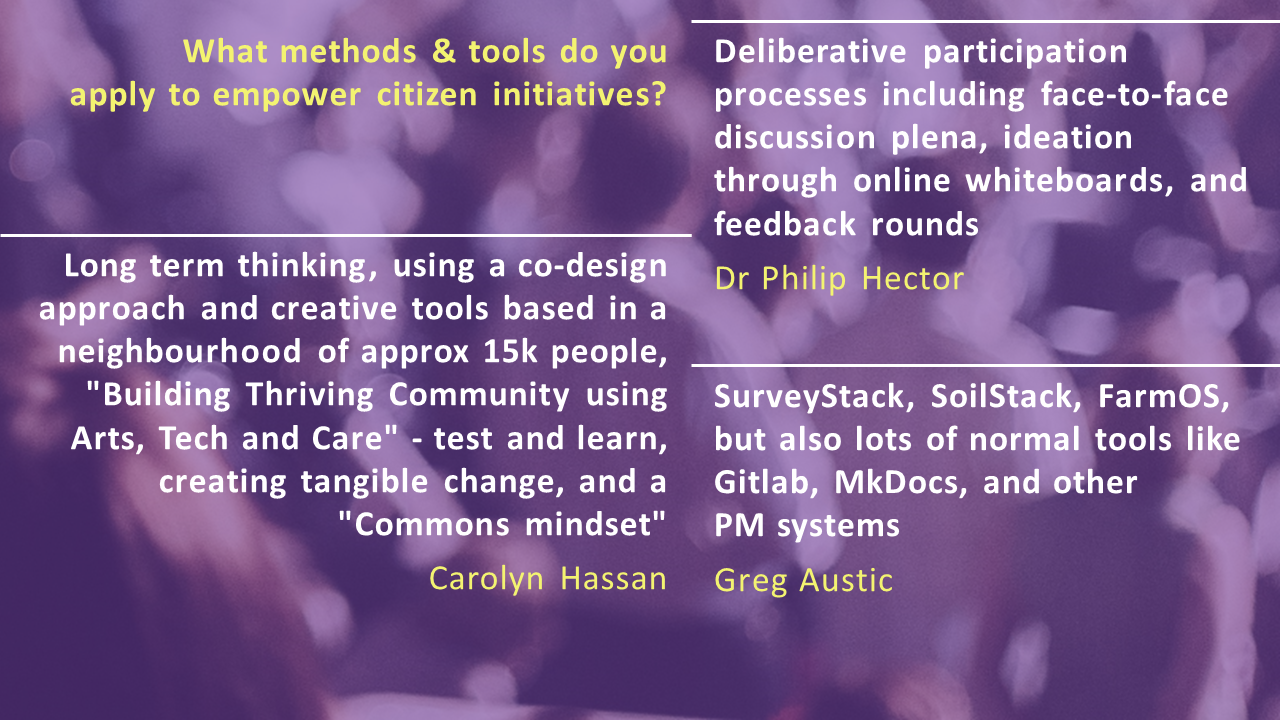
Stephen Sillett, Co-Executive Director at Aiding Dramatic Change in Development: I run an organization Aiding Dramatic Change in Development. We do a lot of work with hyperlocal community development through a project that started in South Africa, in a rural area, going around schools.
We develop these community embedded teams, because we start from the ground up, following the idea of how to create a bit more of an abductive, inference kind of process at the local level, through a programme.
We were doing work with HIV and originally with schools, and the team was then facilitating plays in the different schools. And we did a process that evolved from there to start to map out the community’s priority issues, but within their – what we call – social topography.
We developed this process called Socio-Drama Topography, which is a large group process that can go over three days where you have got kind of a setup, you have got this spatial activity, and then you have got takeaways which can be used later.
That kind of evolved through that process over five, six years, and then got adapted for what might be more in the realm of citizens really. Before, the loop was pretty much between the community based organization and the community itself and the participants.
To link it up to the institutionalized work, we were working with the Eastern Cape Department of Human Settlements to adapt it to adult contexts, looking at environmental health and HIV in the townships – then, with Oxfam, looking at water issues.
That kind of question about how to mix these two modes, one, which is maybe more about capturing the opinions and votes of people into a mechanism where you can then process it. And one, which is more about surprises, narratives, participatory sense making, at a very local level, on a local project.
That Socio-Drama Topography evolved to other spatial activities: We work a lot with spatial activities, ones, which can then also be used in organizations like mapping out people’s field, a strategic action – using fabrics. And then looking at where you implement, and where you explore. At that level, how does that connect to the geographical level? So we are looking at linking up these scales.
We are quite interested in how to tap it in and integrate it with citizen mechanisms, which are a little bit more vote orientated. That is something we are still working on.
We have got something called an Infusion Lab, which is trying to make this kind of bridge in space between the hyperlocal and the kind of more research, so maybe an inquiry space to link the hyperlocal exploration with the more research stable, institutionalized processes, which you kind of need in the state, as we call it the state, because we have a steady state, right?

Eleonora Bru, Air Quality Manager at the Air Quality Organisation of Västmanland: Thank you very much everyone for hearing about what you are doing everyone, it is extremely interesting.
I am working in one of the organisations that Anna Thunell – who is also here today – is leading: It is the Air Quality Organisation in a county called Västmanland in middle Sweden.
In the Air Quality Organisation, we try to find out ways of how to take help from citizens when it comes to decreasing air pollutants and greenhouse gases.
I have also been working with citizens in projects with Engineers Without Borders Sweden, and here I have also been in Nairobi and in Kenya.
I have not been working so much with citizen science or citizens involvement, but I’m very interested in learning more about it.
It was really interesting to hear about your comments, interests, knowledge and experiences. And I will contact some of you from todays meeting for sure.
Sebastian Klemm: What methods and tools have you evolved to empower citizen initiatives?
Sebastian Schlecht, Founder and Director at lala.ruhr – the landscape and architecture laboratory: Thank you very much to Sebastian Klemm to make this exchange possible. I am really happy that I made it, and excited about all the people joining here and the various points of view on the topic of Making Citizens Heard. It is interesting how things come together, how people come together, from where they come and which purpose is driving them.
I am an architect, urbanist and city planner. I worked as an architect and at the City of Essen administration, working for the Green Capital of Europe. That somehow connects me also to Bristol [editors note: Bristol has been European Green Capital in 2015] and I do know some of the topics of Bristol very well. Glad we are connecting here.
Moreover, I worked for an initiative which involves children and young people in built environment education. We also had an initiative that involves young people in the federal state politics, which was also driving me for some years. Today, this initiative has become a network of young people called “Urbane Liga” (website in German).
In the city of Essen, I was the manager of the Green Capital of Europe, and also connected internationally through the ICLEI Local Governments for Sustainability network, with a focus on the ICLEI project called the Urban Transition Alliance, which was focusing on a Social Equity Framework and discussing how can we bring this transformation of cities also in a just framework to people and involve people in climate action and with a network of cities, mostly from North America, Europe, and China. Last week, I was in Malmo at ICLEI conference, therefore I am also happy to meet with people from Sweden here.
What drives me here today is that I have developed a project called lala.ruhr – the landscape and architecture laboratory or rural metropolis. Here, we try to set up a programme and network of all different layers of landscape perspectives on urban environment:
The idea that we can have a livable city only if we can imagine it as a landscape and as part of an ecosystem. In our opinion, it is very important to involve as many different actors as possible.
We aim for a mix of people – from young people, to students, to professionals, to experienced people who already retired, yet are keen to share their experience and knowledge.
We think that we will be able to find a regional framework, a regional stage, and a format to bring all these initiatives together.
We are setting up a format called Biennal of Urban Landscape, held from 10th to 24th September 2022. Here, we bring people together in a real environment in Gelsenkirchen, Germany. From bird lovers, to extinction rebellion, to mayors of regional cities – as well as from different professions – from planning, to digital realms, to biology, to city administrations, to NGOs as well as initiatives which are very local while also connect to international networks.
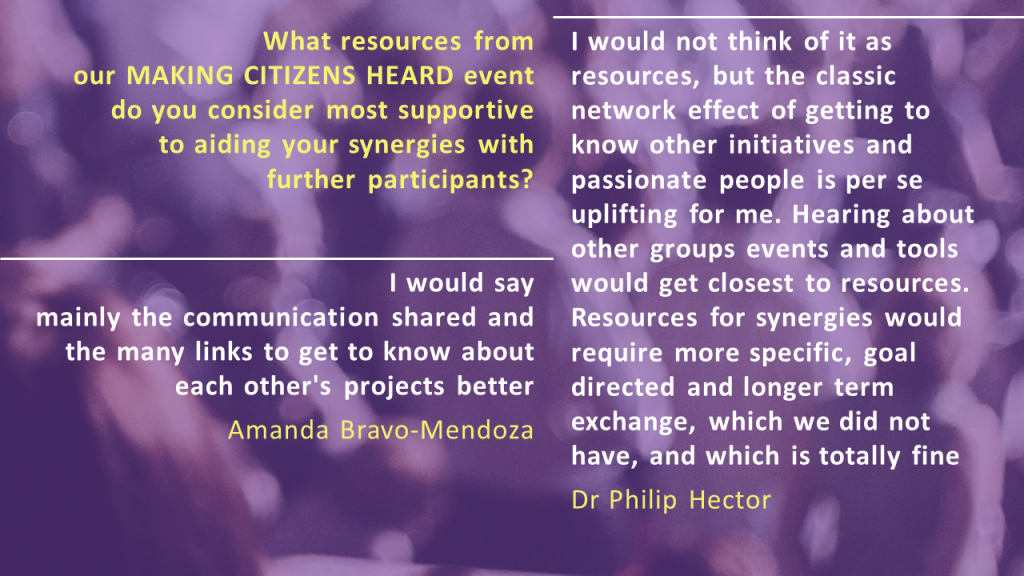
Reach out, if you are interested in next opportunities to raise connectivity for your projects, initiatives and organisations. We are open to work with sustainability impact driven organisations, collectives, researchers, doers and companies.

